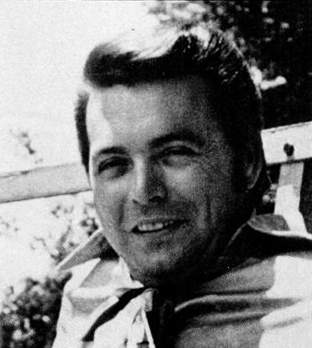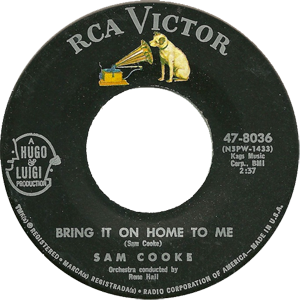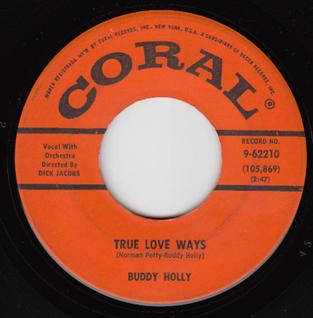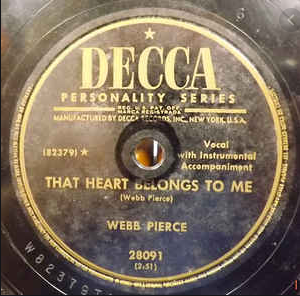Related Research Articles

Mickey Leroy Gilley was an American country music singer and songwriter. Although he started out singing straight-up country and western material in the 1970s, he moved towards a more pop-friendly sound in the 1980s, bringing him further success on not just the country charts, but the pop charts as well.

George Thomas Morgan was a mid-20th-century American country music singer. He is a member of the Country Music Hall of Fame and a former member of the Grand Ole Opry. He is best known for his 1949 hit single "Candy Kisses". He is the father of singer Lorrie Morgan, who is also a country music star.

"You Don't Know Me" is a song written by Eddy Arnold and Cindy Walker in 1955. "You Don't Know Me" was first recorded by Arnold that year and released as a single on April 21, 1956, on RCA Victor. The best-selling version of the song is by Ray Charles, who took it to number 2 on the Billboard Hot 100 chart in 1962, after releasing the song on his number 1 album Modern Sounds in Country and Western Music. The first version of the song to make the Billboard charts was by Jerry Vale in 1956, peaking at number 14 on the pop chart. Arnold's version charted two months later, released as an RCA Victor single, 47–6502, backed with "The Rockin' Mockin' Bird", which reached number 10 on the Billboard country chart. Cash Box magazine, which combined all best-selling versions at one position, included a version by Carmen McRae that never appeared in the Billboard Top 100 Sides listing.
"I'm So Lonesome I Could Cry" is a song written and recorded by American country music singer-songwriter Hank Williams in 1949. The song has been covered by a wide range of musicians.

"Bring It On Home to Me" is a song by American soul singer Sam Cooke, released on May 8, 1962, by RCA Victor. Produced by Hugo & Luigi, and arranged and conducted by René Hall, the song was the B-side to "Having a Party". The song peaked at number two on Billboard's Hot R&B Sides chart, and also charted at number 13 on the Billboard Hot 100. The song has become a pop standard, covered by numerous artists of different genres. It is one of The Rock and Roll Hall of Fame's 500 Songs that Shaped Rock and Roll.
Mickey Gilley was an American country music artist. His discography consists of 28 studio albums, 13 compilation albums, two live albums, 54 singles, and five music videos. 46 of his singles charted on the Billboard Hot Country Songs chart between 1968 and 1989, including 17 number one hits.
"Have You Ever Been Lonely? " is a popular song with music by Peter De Rose and lyrics by Billy Hill, published in 1932. It has been recorded by many singers, becoming a standard.

"True Love Ways" is a song attributed to Norman Petty and Buddy Holly. Buddy Holly's original was recorded with the Dick Jacobs Orchestra in October 1958, four months before the singer's death. It was first released on the posthumous album The Buddy Holly Story, Vol. 2, in March 1960. The song was first released as a single in Britain in May 1960, reaching number 25 on the UK Singles Chart. It was released the following month in the US, but did not make the charts. In 1988, a UK re-release of the recording by MCA, the single reached no. 65 on the UK singles chart in a 5 week chart run.

"Lookin' for Love" is a song written by Wanda Mallette, Bob Morrison and Patti Ryan, and recorded by American country music singer Johnny Lee. It was released in June 1980 as part of the soundtrack to the film Urban Cowboy, released that year. Marcy Levy was one of the female singers who provided backing vocals on the track. "Lookin' for Love" was reissued as the lead song on Lee's October 1980 album of the same name.
"Since I Met You Baby" is an American rhythm and blues song written and recorded by pianist Ivory Joe Hunter. The song, which Hunter recorded in 1956, became an American standard, and saw renewed popularity in 1969 when country music artist Sonny James released his hit version.
"Crazy Arms" is an American country song which was a career-making hit for Ray Price. The song, released in May 1956, went on to become a number 1 country hit that year, establishing Price's sound, and redefining honky-tonk music. It was Price's first No. 1 hit.
"Bouquet of Roses" is a 1948 song written by Steve Nelson (music) and Bob Hilliard (lyrics). It was originally recorded by Eddy Arnold and his Tennessee Plow Boys and his Guitar in Chicago on May 18, 1947. It was released by RCA Victor as catalogue number 20-2806 and by EMI on the His Master's Voice label as catalogue numbers BD 1234 and IM 1399. "Bouquet of Roses" was Eddy Arnold's third number one in a row on the Juke Box Folk Record chart and spent 19 weeks on the Best Selling Folk Records chart. In 1949, when RCA Victor introduced its new 45 RPM single format this record was among seven initial releases and the first in the Country and Western category. Arnold would re-record "Bouquet of Roses" several times during his career.
"The Window Up Above" is a song written and originally recorded by American country music artist George Jones. The version recorded by Jones peaked at number #2 on the country charts and spent a total of 34 weeks on the chart. It became a #1 smash for Mickey Gilley in 1975.
"She Called Me Baby" is a country song written in 1961 by Harlan Howard.
"I Overlooked an Orchid" is a country song that was a hit for Mickey Gilley in 1974. It was first recorded by Carl Smith in 1950, achieving only modest sales when it was released as a single through Columbia Records. Country act Johnnie & Jack recorded the song in 1962 as part of their album Smiles and Tears, then it was released as the B-side to their single "Bye Bye Love" in early 1963.
"That's All That Matters" is a song written by Hank Cochran, and recorded by American country music artist Ray Price in 1964. It has been recorded by multiple other country artists but the most famous recording was done by American country music artist Mickey Gilley. It was released in September 1980 as the first single and partial title track from his album That's All That Matters to Me. The song was Gilley's tenth number one on the country charts. The single went to number one for one week and spent a total of eleven weeks on the country chart.
"Swinging Doors" is a song written and recorded by American country music artist Merle Haggard and The Strangers. It was released in February 1966 as the first single and title track from the album Swinging Doors. The song peaked at number five on the U.S. Billboard Hot Country Singles.
I-40 Country is the 29th album by Jerry Lee Lewis, released on the Mercury label in 1974.

Herbert Paul Gilley was an American country music lyricist and promoter from Kentucky. In his lifetime, he was little known as a songwriter, but decades after his death by drowning at age 27, he was identified more widely as likely having written the lyrics to a dozen famous songs, including two that were hits for Hank Williams: "Cold, Cold Heart" and "I'm So Lonesome I Could Cry". He may have also written "I Overlooked an Orchid", which was a number-one country hit in 1974 for Mickey Gilley. Other songs that have been attributed to Gilley include "If Teardrops Were Pennies", "Don't Let the Stars Get in Your Eyes", and "Crazy Arms".

"That Heart Belongs to Me" is a country music song written and recorded by Webb Pierce. It was released in 1952 on the Decca label. In June 1952, the song reached the No. 1 spot on the Jockey chart. It peaked at No. 2 on the Juke Box chart and No. 5 on the Best Seller chart. In Billboard's year-end country chart for 1952, it ranked No. 20.
References
- ↑ "The Billboard Book of Number One Country Hits" (Billboard Books, Watson-Guptill Publications, New York, 1991 ( ISBN 0-82-307553-2)), p. 115
- ↑ "Country Music: The Encyclopedia," St. Martin's Press, New York, 1997 ( ISBN 0-312-15121-7)
- ↑ Roland.
- ↑ "Country Music: The Encyclopedia."
- ↑ Whitburn, Joel (2004). The Billboard Book Of Top 40 Country Hits: 1944-2006, Second edition. Record Research. p. 136.
- ↑ Kent, David (1993). Australian Chart Book 1970–1992 (illustrated ed.). St Ives, N.S.W.: Australian Chart Book. p. 125. ISBN 0-646-11917-6.